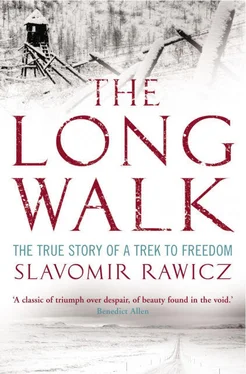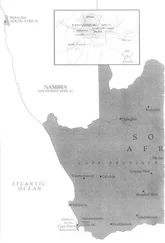The American said that eventually he was sure we should see them drop on all fours like bears. But they never did.
Their faces I could not see in detail, but the heads were squarish and the ears must lie close to the skull because there was no projection from the silhouette against the snow. The shoulders sloped sharply down to a powerful chest. The arms were long and the wrists reached the level of the knees. Seen in profile, the back of the head was a straight line from the crown into the shoulders — ‘like a damned Prussian’, as Paluchowicz put it.
We decided unanimously that we were examining a type of creature of which we had no previous experience in the wild, in zoos or in literature. It would have been easy to have seen them waddle off at a distance and dismissed them as either bear or big ape of the orang-outang species. At close range they defied facile description. There was something both of the bear and the ape about their general shape but they could not be mistaken for either. The colour was a rusty kind of brown. They appeared to be covered by two distinct kinds of hair — the reddish hair which gave them their characteristic colour forming a tight, close fur against the body, mingling with which were long, loose, straight hairs, hanging downwards, which had a slight greyish tinge as the light caught them.
Dangling our feet over the edge of the rock, we kept them closely under observation for about an hour. They were doing nothing but move around slowly together, occasionally stopping to look around them like people admiring a view. Their heads turned towards us now and again, but their interest in us seemed to be of the slightest.
Then Zaro stood up. ‘We can’t wait all day for them to make up their minds to move. I am going to shift them.’
He went off into a pantomime of arm waving, Red Indian war dancing, bawling and shrieking. The things did not even turn. Zaro scratched around and came up with half-a-dozen pieces of ice about a quarter-inch thick. One after another he pitched them down towards the pair, but they skimmed erratically and lost direction. One missile kicked up a little powder of snow about twenty yards from them, but if they saw it they gave no sign. Zaro sat down again, panting.
We gave them another hour, but they seemed content to stay where they were. I got the uncomfortable feeling they were challenging us to continue our descent across their ground.
‘I think they are laughing at us,’ said Zaro.
Mister Smith stood up. ‘It occurs to me they might take it into their heads to come up and investigate us. It is obvious they are not afraid of us. I think we had better go while we are safe.’
We pushed off around the rock and directly away from them. I looked back and the pair were standing still, arms swinging slightly, as though listening intently. What were they? For years they remained a mystery to me, but since recently I have read of scientific expeditions to discover the Abominable Snowman of the Himalayas and studied descriptions of the creature given by native hillmen, I believe that on that day we may have encountered two of the animals. I do insist, however, that recent estimates of their height as about five feet must be wrong. The minimum height of a well-grown specimen must be around seven feet.
I think that, in causing a deviation of route, they brought our final disaster upon us.
It was about midday that we set off to continue our descent. Everything went well and we made good time Our spirits were up in spite of our empty bellies. We found an almost ideal cavity among the rocks to spend the night, were greeted by another clear, fine April morning breaking through a thin, quickly-dissipated mist.
Two hours later it happened. Zaro and I had the rope’s end belayed around our two stout sticks at the crest of a slope. I was laughing at something Zaro had said about the two strange creatures of the day before. The slope was short and hardly steep enough to warrant the use of the rope, which lay loosely thrown out as a safety line in case Paluchowicz, crawling down backwards on all fours, should slip into an unseen crevice. Behind him were Smith and Kolemenos, well spaced out. All three were astride the limp rope without holding it.
I saw Paluchowicz reach the end of the slope. I turned to Zaro and in that instant saw the rope jerk about the sticks and become slack again. Simultaneously there was a brief, sharp cry, such as a man will make when he is suddenly surprised. Zaro and I swung together. It was a second or two before the awful truth struck me. Smith was there. Kolemenos was there. But Paluchowicz had vanished. Like fools we stood there calling out his name. No one answered. The other two, with their backs to Paluchowicz, did not know what had happened. They had stopped at our first shout and were looking up at us.
‘Come back,’ I called out to them. ‘Something has happened to Anton.’
They clambered back, I hauled in the rope and tied the loose end about my waist. ‘I am going down to see if I can find him,’ I said.
I reached the point where, from above, the slope appeared to fall gently away. Zaro took in the slack of the rope and I turned around as I had seen Paluchowicz do. The sight made me catch my breath. The mountain yawned open as though it had been split clean open with a giant axe blow. I was looking across a twenty-yard gap, the narrowest part of the chasm which dropped sickeningly below me. I could not see the bottom. I felt the sweat beading out on my forehead. Futilely I yelled, ‘Anton, Anton!’ I turned and went back, so shaken that I held tightly to the rope all the way.
They all talked at once. Had I seen him? Why was I shouting? Where was he?
I told them what it was like down there, that there was no sign of Paluchowicz.
‘We will have to find him,’ said Kolemenos.
‘We will never find him,’ I told them. ‘He is gone.’
Nobody wanted to believe it. I did not want to believe it myself. With difficulty we broke a way round to a new point from which we could look down into the abyss. Then they understood. We heaved a stone down and listened for it to strike. We heard nothing. We found a bigger stone and dropped that down and there was still no echo of the strike.
We hung around there a long time, not knowing what to do. The disaster was so sudden, so complete. Paluchowicz was with us and then he was gone, plucked away from us. I never thought he would have to die. He seemed indestructible. Tough, toothless, devout old Sergeant Paluchowicz.
‘All this way,’ said the American. ‘All this way, to die so stupidly at the last.’ I think he felt it more than any of us. As the two older men, they had been close together.
Kolemenos took his sack from his back and very deliberately tore it down the seams. We all stood silent. He put a stone in the corner and threw it out into space. The stone fell out and the sack floated away, a symbolic shroud for Paluchowicz. He took his stick and with the blunted axe chopped an end off and made a cross and stuck it there, on the edge.
We climbed on down, trying to keep in sight the spot from which Paluchowicz had disappeared, vaguely hoping we might find his body. But we never found the bottom of the great cleft and we never found Paluchowicz.
There were some quite warm days after this and we could look back and see the majesty of the mountains we had crossed. We were in terrible need of food and now that the supreme effort was over we could barely keep ourselves moving. One day we saw a couple of long-haired wild goats, which bounded off like the wind. They need not have been afraid. We hardly had the strength to kill anything bigger than a beetle. The country was still hilly, but there were rivers and streams and birds in trees.
We had been about eight days without food when we saw far off to the east on a sunny morning a flock of sheep with men and dogs in charge. They were too far off to be of any help to us and were moving away from us, but our hopes rose at the sight of them. Soon we must be picked up. We pulled some green-stuff growing at the edge of a stream and tried to eat it, but it was very bitter and our stomachs would not take it.
Читать дальше






![Джеффри Арчер - The Short, the Long and the Tall [С иллюстрациями]](/books/388600/dzheffri-archer-the-short-the-long-and-the-tall-s-thumb.webp)





